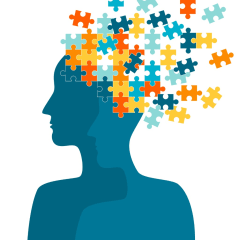Locating the Best Psychologist in Delhi: An Overview to Your Psychological Wellness Trip
Locating the Best Psychologist in Delhi: An Overview to Your Psychological Wellness Trip
Blog Article
Psych Therapy: A Comprehensive Guide to Outcomes and strategies

Cognitive-Behavioral Treatment
Cognitive-Behavioral Therapy (CBT) is a widely used psychotherapeutic strategy that focuses on identifying and modifying dysfunctional thinking and actions patterns. Created in the 1960s by Aaron T. Beck, CBT combines behavior and cognitive theories to attend to numerous psychological health and wellness issues, including clinical depression, anxiousness, and stress-related problems. The premise of CBT is that maladaptive ideas add to psychological distress and maladaptive habits. By restructuring these ideas, people can attain significant improvements in their emotional wellness and daily performance.
Methods such as cognitive restructuring, exposure treatment, and skill-building exercises are generally utilized. Cognitive restructuring entails challenging and altering unfavorable idea patterns, while direct exposure treatment intends to decrease worry and stress and anxiety with steady exposure to been afraid items or situations.
Evidence-based research study sustains the efficacy of CBT for a vast array of mental disorders - Best Psychologist in Delhi. Its focus on skill procurement and self-help techniques equips customers to proceed progression separately after therapy ends. The flexibility and effectiveness of CBT have made it a cornerstone in modern psychotherapeutic technique
Psychodynamic Techniques
Rooted in the very early concepts of Sigmund Freud, psychodynamic approaches concentrate on checking out the unconscious mind and its influence on behavior and emotions. These methods intend to reveal surprise ideas and feelings that may be driving maladaptive behaviors and mental distress. Central to this method is the principle of internal dispute, usually originating from unsettled previous experiences, particularly those from childhood.
Therapists making use of psychodynamic techniques employ numerous essential techniques, consisting of free organization, where clients are motivated to talk easily to disclose subconscious material, and desire analysis, which analyzes the unrealized content of desires. In addition, the expedition of transfer and countertransference characteristics within the restorative partnership is vital. These interactions can give insights right into the person's internal globe and relational patterns.
Psychodynamic treatment is generally longer-term compared to various other modalities, providing a extensive and deep understanding of the individual's mind. Research study suggests that it can be especially reliable for complicated psychological wellness issues, such as personality disorders and chronic depression. By promoting self-awareness and emotional insight, psychodynamic therapy seeks to bring unconscious material to consciousness, enabling individuals to accomplish long lasting and significant adjustment in their lives.
Humanistic Methods
Structure on the foundations laid by psychodynamic methods, humanistic techniques offer a distinct viewpoint focused on individual possible and self-actualization. Coming from the mid-20th century, these strategies focus on the inherent benefits and development possibility of individuals, stressing a holistic sight of human experience. Key numbers such as Carl Rogers and Abraham Maslow have dramatically affected this therapeutic strategy, which encompasses approaches like client-centered treatment and Gestalt treatment.
Client-centered therapy, developed by Rogers, plays a pivotal function in humanistic methods. It depends on the therapist giving an atmosphere of genuine favorable respect, empathy, and harmony. This fosters a risk-free space for clients to explore their feelings and experiences without judgment, helping with self-discovery and personal growth. The specialist's duty is even more of a facilitator than an authority, encouraging clients to harness their inner sources for recovery.
Gestalt treatment, an additional vital humanistic method, emphasizes present minute awareness and the assimilation of body and mind. By concentrating on the "present get redirected here moment," customers get better understanding right into their current feelings and habits. Strategies such as role-playing and guided visualization are commonly used to help clients get a much deeper understanding of themselves, eventually resulting in enhanced self-awareness and gratification.
Integrative Treatments
Integrative therapies represent a synthesis of different restorative techniques customized to meet the one-of-a-kind needs of each client. This strategy recognizes the complexity of human psychology and the complex nature of mental health and wellness problems. By combining elements from various institutions of psychiatric therapy-- such as cognitive-behavioral treatment (CBT), psychodynamic therapy, and humanistic techniques-- integrative treatments use an even more alternative and adaptable therapy paradigm.
Specialists of integrative treatment evaluate each customer's particular needs, signs and symptoms, and personal history to design a tailored treatment strategy. This customized strategy boosts the capacity for therapeutic success by addressing the origin of mental distress and advertising total wellness. Methods may include mindfulness exercises, cognitive restructuring, and psychological handling, each picked to target different aspects why not try this out of the client's issues.
Moreover, integrative treatments emphasize the therapeutic connection, seeing the client-therapist bond as a critical element of efficient therapy. This partnership cultivates an encouraging setting where clients feel safe to explore and resolve their issues. The adaptability of integrative treatments makes them appropriate for a broad array of conditions, including anxiety, clinical depression, trauma, and social troubles, thus raising their applicability and efficiency in diverse professional settings.

Determining Therapy End Results
Examining the efficiency of psychotherapy is crucial for both medical professionals and clients to ensure that the therapy is yielding the wanted end results. To attain this, different approaches and tools are used to measure treatment outcomes systematically. Standardized analysis instruments, such as the Beck Clinical Depression Supply (BDI) and the Generalized Stress And Anxiety Problem 7 (GAD-7), offer measurable information on signs and symptom seriousness and adjustments over time.
In enhancement to standardized devices, qualitative methods like customer self-reports and clinical meetings offer important understandings into the individual experiences and perceived development of customers. Regularly arranged examinations, commonly at the start, axis, and end of treatment, help in tracking the trajectory of improvement or identifying areas needing change.
Outcome measurement is not restricted to symptom reduction; it likewise incorporates useful enhancements in life, such as far better interpersonal partnerships, increased work productivity, and improved total health. Modern advancements in digital health and wellness have actually presented mobile applications and on-line systems that facilitate real-time monitoring and feedback, even more refining the assessment process.
Ultimately, a comprehensive approach to measuring therapy outcomes guarantees that therapeutic treatments are efficient, reliable, and customized to satisfy the private requirements of clients, thus optimizing the overall therapeutic experience.
Verdict
Psychiatric therapy supplies a multifaceted variety of strategies aimed at addressing details mental health concerns and enhancing overall health. Cognitive-Behavioral Treatment and psychodynamic methods target dysfunctional thoughts and subconscious influences, respectively. Humanistic strategies concentrate on personal development and self-actualization, while integrative treatments incorporate multiple approaches for customized treatment strategies. Assessing therapy outcomes via qualitative approaches and standardized evaluations makes certain a detailed understanding of effectiveness, inevitably directing clients towards withstanding psychological health improvements.
From the structured strategy of Cognitive-Behavioral Therapy (CBT) to the deep exploration of the unconscious in psychodynamic treatment, each method brings distinct advantages. Its focus on skill procurement and self-help techniques equips customers Home Page to continue progression independently after therapy concludes (Best Psychologist in Delhi). Trick figures such as Carl Rogers and Abraham Maslow have considerably affected this healing approach, which includes techniques like client-centered therapy and Gestalt treatment

Report this page